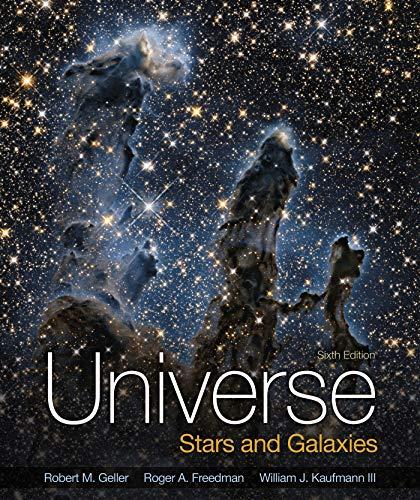
Universe: Stars And Galaxies
6th Edition
ISBN: 9781319115098
Author: Roger Freedman, Robert Geller, William J. Kaufmann
Publisher: W. H. Freeman
expand_more
expand_more
format_list_bulleted
Question
Chapter 7, Problem 34Q
To determine
The reason whether a person can use a compass to find the way to Venus or not.
Expert Solution & Answer
Want to see the full answer?
Check out a sample textbook solution
Students have asked these similar questions
How long, deep, and wide would a terrestrial chasm have to be to have the
same proportions relative to the Earth that Valles Marineris has to Mars?
What is the escape velocity is km/s from Venus' exosphere, which begins about 202 km above the surface ? Assume the gravitational constant is G= 6.67 x10-11m3 kg-1s-2, and that's Venus has a mass of 5.2e+24 kg and a radius of 6500.0 km
100%
Normal text
Arlal
12.5
| I1 1 | 2 | 3
3. Fill out this data table with information you have collected about the solar system planets.
Characteristics
Unit
Mercury
Venus
Earth
330
4,870
5,970
Mass
1024 g
61
928
1,083
Volume
1024 cm3
5.4
5.4
50
Density
g/cm3
58
106 km
100
100
Distance from Sun
Radius
km
Crust Thickness
km
Atmosphere Height
km
Chapter 7 Solutions
Universe: Stars And Galaxies
Ch. 7 - Prob. 1QCh. 7 - Prob. 2QCh. 7 - Prob. 3QCh. 7 - Prob. 4QCh. 7 - Prob. 5QCh. 7 - Prob. 6QCh. 7 - Prob. 7QCh. 7 - Prob. 8QCh. 7 - Prob. 9QCh. 7 - Prob. 10Q
Ch. 7 - Prob. 11QCh. 7 - Prob. 12QCh. 7 - Prob. 13QCh. 7 - Prob. 14QCh. 7 - Prob. 15QCh. 7 - Prob. 16QCh. 7 - Prob. 17QCh. 7 - Prob. 18QCh. 7 - Prob. 19QCh. 7 - Prob. 20QCh. 7 - Prob. 21QCh. 7 - Prob. 22QCh. 7 - Prob. 23QCh. 7 - Prob. 24QCh. 7 - Prob. 25QCh. 7 - Prob. 26QCh. 7 - Prob. 27QCh. 7 - Prob. 28QCh. 7 - Prob. 29QCh. 7 - Prob. 30QCh. 7 - Prob. 31QCh. 7 - Prob. 32QCh. 7 - Prob. 33QCh. 7 - Prob. 34QCh. 7 - Prob. 35QCh. 7 - Prob. 36QCh. 7 - Prob. 37QCh. 7 - Prob. 38QCh. 7 - Prob. 39QCh. 7 - Prob. 40QCh. 7 - Prob. 41Q
Knowledge Booster
Learn more about
Need a deep-dive on the concept behind this application? Look no further. Learn more about this topic, physics and related others by exploring similar questions and additional content below.Similar questions
- Explain the differences between the Grand Canyon on Earth and Valles Marineris on Mars.arrow_forwardWhat is a dust devil? Would you expect to feel more of a breeze from a dust devil on Mars or on Earth? Explain.arrow_forwardWould you expect as many impact craters per unit area on the surface of Venus as on the surface of Mars? Why or why not?arrow_forward
- What is the composition of the polar caps on Mars?arrow_forwardDescribe the planet Venus. Attributes like atmosphere, rotation, etc. should be included in your description.arrow_forwardThe average distance from Earth to Mars is 1.5 AU. If you send a command using radio waves (a form of light!) to a rover on the Mars surface, how long will you have to wait before you receive the response? Assume the rover responds immediately after it receives the commandarrow_forward
- The average distance to Mars is 1.5 AU. If you send a command using radio waves (a form of light!) to a rover on the Mars surface, how long will you have to wait before you receive the response? Assume the probe responds immediately after it receives the command.arrow_forwardA)At what altitude would a geostationary sattelite need to be above the surface of Mars? Assume the mass of Mars is 6.39 x 1023 kg, the length of a martian solar day is 24 hours 39minutes 35seconds, the length of the sidereal day is 24hours 37minutes 22seconds, and the equatorial radius is 3396 km. The answer can be calculated using Newton's verison of Kepler's third law.arrow_forwardWhat is the escape velocity in km/s from Venus' exosphere, which begins about 168 km above the surface? Assume the gravitational constant is G = 6.67 × 10-11 m3 kg-1 s-2, and that Venus has a mass of 4.9e+24 kg and a radius of 5800.0 km.arrow_forward
- If we moved Venus out to 1 AU from the Sun (same as Earth), Venus would probably a. become more like Earth, with oceans and a temperate climate b. remain hot, dry, and dead because it's permanently lost its oceans c. become more like Mars, losing most of its atmosphere and freezing d. become much less geologically active due to decreased solar heatingarrow_forwardName one volcano on venus.arrow_forwardIf you weigh 150 lbs. on the surface of Earth, how much would you weigh on Venus? On Mars?arrow_forward
arrow_back_ios
SEE MORE QUESTIONS
arrow_forward_ios
Recommended textbooks for you

 AstronomyPhysicsISBN:9781938168284Author:Andrew Fraknoi; David Morrison; Sidney C. WolffPublisher:OpenStax
AstronomyPhysicsISBN:9781938168284Author:Andrew Fraknoi; David Morrison; Sidney C. WolffPublisher:OpenStax
 An Introduction to Physical SciencePhysicsISBN:9781305079137Author:James Shipman, Jerry D. Wilson, Charles A. Higgins, Omar TorresPublisher:Cengage Learning
An Introduction to Physical SciencePhysicsISBN:9781305079137Author:James Shipman, Jerry D. Wilson, Charles A. Higgins, Omar TorresPublisher:Cengage Learning Foundations of Astronomy (MindTap Course List)PhysicsISBN:9781337399920Author:Michael A. Seeds, Dana BackmanPublisher:Cengage Learning
Foundations of Astronomy (MindTap Course List)PhysicsISBN:9781337399920Author:Michael A. Seeds, Dana BackmanPublisher:Cengage Learning Stars and Galaxies (MindTap Course List)PhysicsISBN:9781337399944Author:Michael A. SeedsPublisher:Cengage Learning
Stars and Galaxies (MindTap Course List)PhysicsISBN:9781337399944Author:Michael A. SeedsPublisher:Cengage Learning


Astronomy
Physics
ISBN:9781938168284
Author:Andrew Fraknoi; David Morrison; Sidney C. Wolff
Publisher:OpenStax


An Introduction to Physical Science
Physics
ISBN:9781305079137
Author:James Shipman, Jerry D. Wilson, Charles A. Higgins, Omar Torres
Publisher:Cengage Learning

Foundations of Astronomy (MindTap Course List)
Physics
ISBN:9781337399920
Author:Michael A. Seeds, Dana Backman
Publisher:Cengage Learning

Stars and Galaxies (MindTap Course List)
Physics
ISBN:9781337399944
Author:Michael A. Seeds
Publisher:Cengage Learning
Kepler's Three Laws Explained; Author: PhysicsHigh;https://www.youtube.com/watch?v=kyR6EO_RMKE;License: Standard YouTube License, CC-BY